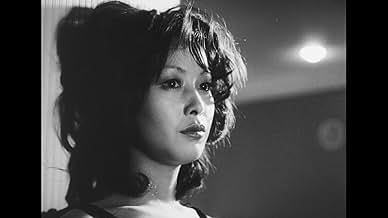VALUTAZIONE IMDb
6,2/10
1121
LA TUA VALUTAZIONE
Aggiungi una trama nella tua linguaA revolutionary faction steals some hand bombs. While escaping, several soldiers are killed. The movement's highest authority deems October unfit and sends the leader of another faction to t... Leggi tuttoA revolutionary faction steals some hand bombs. While escaping, several soldiers are killed. The movement's highest authority deems October unfit and sends the leader of another faction to take the remaining bombs.A revolutionary faction steals some hand bombs. While escaping, several soldiers are killed. The movement's highest authority deems October unfit and sends the leader of another faction to take the remaining bombs.
- Regia
- Sceneggiatura
- Star
Recensioni in evidenza
Having greatly enjoyed Wakamatsu's earlier film Go, Go Second Time Virgin, I was very excited to come across this one. The excitement was however short lived. Or should I say endless because that is about how long this movie seems. Rarely have I looked at the counter on my VCR more often to see how much more I would have to endure.
It was much the same feeling as when after seeing Godard's wonderfully early new wave movies, I was subjected to La Chinoise or Pierrot Le Fou. Actually Ecstacy of the Angels seem very much inspired by this more avant-garde side of Godard's film-making. But without the originality.
There is plenty of sex and violence here, and layers and layers of what is most likely satire on political idealism and the media's exploitation of sex and violence. And possibly even sex and violence in cinema itself. A film mocking film maybe. There is that term yet again: Sex and violence. Usually a safe recipe for good entertainment, be it in celluloid or newsprint form. But the problem here is that the message is lost in all the boring scenes and purposely stiff dialog. You will quickly lose track of who belongs to which revolutionary faction. You are probably supposed to. Is the movie supposed to show us how predictable and repetitious our lust for sex and violence is? Because it's all the same here. Every scene is just more of the same. Tedious repetition. Maybe that is the message. Is that why all the characters are named after seasons and weekdays? Possibly.
Whatever it is, it all seems rather outdated and unoriginal now. It's just plain boring. Maybe it wasn't in Japan in 1972.
You do sort of get a picture of the screenplay being written on a roll of toilet paper by a couple of drunk pretentious intellectuals looking for an excuse to get some young actresses to take their clothes off. Which would in that case be the one side of this movie that would seem perfectly reasonable to me. I'm sure there is an intellectual masterpiece in there somewhere. A deeper meaning. But life is just to short to look for it. I simply cannot bear to watch this one again.
It was much the same feeling as when after seeing Godard's wonderfully early new wave movies, I was subjected to La Chinoise or Pierrot Le Fou. Actually Ecstacy of the Angels seem very much inspired by this more avant-garde side of Godard's film-making. But without the originality.
There is plenty of sex and violence here, and layers and layers of what is most likely satire on political idealism and the media's exploitation of sex and violence. And possibly even sex and violence in cinema itself. A film mocking film maybe. There is that term yet again: Sex and violence. Usually a safe recipe for good entertainment, be it in celluloid or newsprint form. But the problem here is that the message is lost in all the boring scenes and purposely stiff dialog. You will quickly lose track of who belongs to which revolutionary faction. You are probably supposed to. Is the movie supposed to show us how predictable and repetitious our lust for sex and violence is? Because it's all the same here. Every scene is just more of the same. Tedious repetition. Maybe that is the message. Is that why all the characters are named after seasons and weekdays? Possibly.
Whatever it is, it all seems rather outdated and unoriginal now. It's just plain boring. Maybe it wasn't in Japan in 1972.
You do sort of get a picture of the screenplay being written on a roll of toilet paper by a couple of drunk pretentious intellectuals looking for an excuse to get some young actresses to take their clothes off. Which would in that case be the one side of this movie that would seem perfectly reasonable to me. I'm sure there is an intellectual masterpiece in there somewhere. A deeper meaning. But life is just to short to look for it. I simply cannot bear to watch this one again.
Koji Wakamatsu's treatment of this story is, compared to big budget filming, what guerilla warfare is to a full blown World War. Imagine seeing a hysterical comedy about idealistic terrorists betrayed by their leaders as written by Jean-Luc Godard, produced by David Lynch and directed by Gregg Araki: that gets you somewhere in the neighbourhood of what this picture is like. Untroubled by storytelling conventions Wakamatsu lets the thin thread that holds all scenes more or less together snap halfway through the film. His scenes of bloodcurdling violence are thrown at you with the gusto of a rabid modern painter. Visually brilliant and wonderfully over the top with some poignantly funny touches, this ranks as one of the most enthralling political nightmares ever printed on celluloid.
I watched this film, with very little knowledge of Koji Wakamatsu and his films. I had recently seen "Dare to Stop Us" a film about Wakamatsu through the eyes of his assistant. Actually, it was through that film that I became more interested in his work. Fortunately, a museum where I live was doing a small retrospective that included Ecstasy of Angels.
I really didn't know what to expect, and having seen "Dare to Stop Us" I was expecting a micro-budget affair and very amateur performances. My experience was the exact opposite. Wakamatsu definitely knew how to make films and I was pleasantly surprised by the performances. I really enjoyed Ecstasy of Angels.
A brief summary of the film; a group of radical activists soon turn on one another after stealing a large amount of explosives from a US Army base. The characters have unusual names such as Monday and October, and the sects themselves are named after the seasons. I wasn't able to actually follow who was who by their names, however, but each character was distinctive enough that I could follow what was going on.
That is essentially the plot of Ecstasy of Angels. We watch the different radical groups fall apart and turn on each other. It's a study of power dynamics. What made me so fascinated with this film, is how well paced Wakamatsu was able to deliver the plot. I was never bored. He does some interesting things shifting back and forth from black and white and color. The film also contains a fair amount of sex and nudity. However, the sex is simulated, and other then women's breasts you really don't see anything too graphic, especially by today's standards.
Ecstasy of Angels is very much an art film and it is low budget. I think fans of Wakamatsu and early 60s Japanese filmmaking would enjoy this film. I'm not sure the average movie-goer would however. In fact, in an auditorium of about 40 people, around 10 people left during the film. Not exactly a ringing endorsement. But I'm endorsing it, I liked it from beginning to end and maybe you will too.
Give Ecstasy of Angels a chance and see it if you ever get the opportunity.
I really didn't know what to expect, and having seen "Dare to Stop Us" I was expecting a micro-budget affair and very amateur performances. My experience was the exact opposite. Wakamatsu definitely knew how to make films and I was pleasantly surprised by the performances. I really enjoyed Ecstasy of Angels.
A brief summary of the film; a group of radical activists soon turn on one another after stealing a large amount of explosives from a US Army base. The characters have unusual names such as Monday and October, and the sects themselves are named after the seasons. I wasn't able to actually follow who was who by their names, however, but each character was distinctive enough that I could follow what was going on.
That is essentially the plot of Ecstasy of Angels. We watch the different radical groups fall apart and turn on each other. It's a study of power dynamics. What made me so fascinated with this film, is how well paced Wakamatsu was able to deliver the plot. I was never bored. He does some interesting things shifting back and forth from black and white and color. The film also contains a fair amount of sex and nudity. However, the sex is simulated, and other then women's breasts you really don't see anything too graphic, especially by today's standards.
Ecstasy of Angels is very much an art film and it is low budget. I think fans of Wakamatsu and early 60s Japanese filmmaking would enjoy this film. I'm not sure the average movie-goer would however. In fact, in an auditorium of about 40 people, around 10 people left during the film. Not exactly a ringing endorsement. But I'm endorsing it, I liked it from beginning to end and maybe you will too.
Give Ecstasy of Angels a chance and see it if you ever get the opportunity.
This is an excellent film, flawed in the sense that certain aspects of the fictional revolutionary group appear quite caricatured at times but viewed in relation with director Koji Wakamatsu's newest film "United Red Army" it can be seen to draw a surprisingly accurate picture of the revolutionary nihilism of the Japanese student activists of the time. Other reviewers have compared the film to Godard's early work such as La Chinoise and admittedly the artistic style is quite similar though less refined, and far from being less politically aware than Godard, Wakamatsu was actually much more realistically cynical in his portrait of armed student activist cells whereas Godard's revolutionary themed films displayed a certain hopeful naiveté in the potential of a largely dogmatic and authoritarian movement which was strongly criticized by his contemporaries in the Situationist International. The writer of this film Masao Adachi was certainly not a pretentious intellectual out to exploit sex and revolutionary pop aesthetic as some critics have inferred here; a closer look at his personal history shows that shortly after writing the screenplay he actually moved to Lebanon to join the real life armed revolutionary group the Japanese Red Army where he remained a committed activist for 28 years up until his arrest in the year 2000. As such the film can be a unique and telling account of his own mentality and the personal motivations which led to joining the JRA, as well as his prior knowledge of the less-than-ideal dynamics of the lifestyle he would be choosing. One must keep in mind that at the time Wakamatsu was expected by producers to be making films in the 'pink' genre which would explain the gratuitous sex scenes that could be seen as offensive or pointless to some but the unique beauty of the film far outweigh it's occasional rough edges. Highly recommended, though not for casual viewers of film "for entertainment's sake" alone.
I found I liked this a little less than I did when first seen on video a few years ago. Perhaps it just shows what effect 9/11 and subsequent worldwide terrorist activities have had on our psyche. This remains a well put together, exciting and amusing tale of confused young fighters (for they know not what) on the streets of Tokyo late 60's. The pace and style of Wakamatsu's film making is infectious but the pain of events and concerns for safety have made it much more difficult to be sympathetic to lost youth taking it out on innocent people. It's a shame because this, almost Godard like, movie so full of vitality, could inspire many to take up the making of movies but instead one is now frightened that the vulnerable might be encouraged in their cowardliness to take out others for a bit of glory. A sad reflection of the times we find ourselves in. Good film though!
Lo sapevi?
- QuizThis film was released in a time of violent social turmoil for Japan. ATG, the film's distributor, got cold feet when a rash of Christmas tree bombing, similar to the one in the movie, started to plague the streets of Tokyo. The film was quickly withdrawn from distribution and briefly re-released in the art theater circuit.
- BlooperWhile the revolutionaries enter the base, a sign reading "weapon wearhouse" instead of "weapon warehouse" is clearly visible for several seconds.
- ConnessioniEdited into Gli ultimi giorni dell'umanità (2022)
I più visti
Accedi per valutare e creare un elenco di titoli salvati per ottenere consigli personalizzati
- How long is Ecstasy of the Angels?Powered by Alexa
Dettagli
Botteghino
- Lordo in tutto il mondo
- 585 USD
- Tempo di esecuzione1 ora 29 minuti
- Colore
- Mix di suoni
- Proporzioni
- 2.35 : 1
Contribuisci a questa pagina
Suggerisci una modifica o aggiungi i contenuti mancanti

Divario superiore
By what name was Estasi degli angeli (1972) officially released in Canada in English?
Rispondi

















